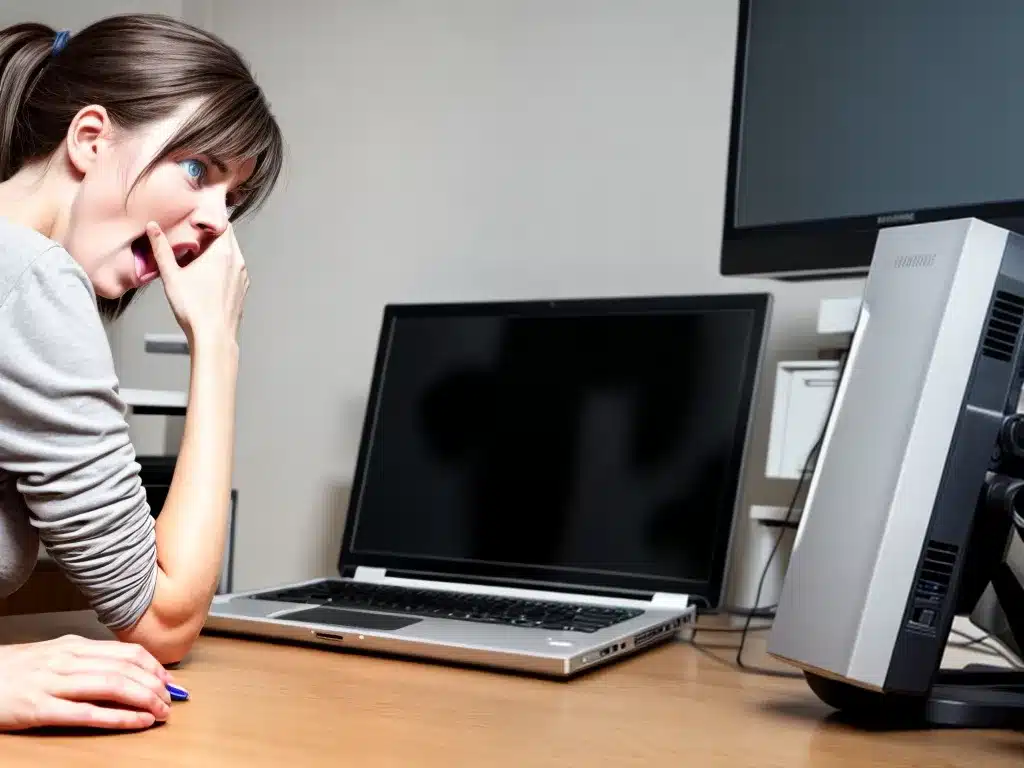
A slow computer can be incredibly frustrating. As I use my computer every day for work, entertainment and communicating with friends, a sudden slowdown can seriously impact my productivity and enjoyment.
Fortunately, computer slowdowns usually stem from common issues that can be addressed. Here are the 10 most common causes for a slow computer and how to fix them:
1. Too Many Startup Programs
Having too many programs automatically start when your computer boots can bog things down. Startup programs load into your computer’s memory and take up valuable RAM that could be better used for your active programs and tasks.
To fix this:
- Open the Start menu and type “startup” to access your startup programs list.
- Disable any programs you don’t need launched automatically, like sidebar utilities and third-party media apps.
- Alternatively, download a startup manager program for more control.
With fewer programs running in the background, your computer can devote more resources to the programs you actively use.
2. Too Many Browser Tabs Open
The more tabs you have open in your web browser, the more memory and CPU power it requires. Having too many browser tabs open can definitely lead to a slow computer.
To fix this:
- Close tabs you aren’t using. Keep only essential tabs open.
- Use OneTab extensions to save tabs in a list for later reading. This unloads them from memory.
- Consider using multiple browser windows rather than packing many tabs into one window.
Actively managing your open browser tabs can help web browsing feel smooth again.
3. Hard Drive Almost Full
When your hard drive storage space is nearly full, your computer slows down. Windows needs free space to create temporary files and run programs.
To fix this:
- Run Disk Cleanup to remove unnecessary Windows files and temporary files.
- Uninstall large programs you no longer use.
- Move files like photos, videos and music to an external hard drive or cloud storage.
- Upgrade to a larger hard drive if necessary.
Freeing up hard drive space gives your computer breathing room to run faster.
4. Too Many Programs Running
Having many software programs and apps running simultaneously puts demand on your RAM, CPU and hard drive. The more active programs, the more your computer has to juggle, which can mean slow performance.
To fix this:
- Close any programs you aren’t actively using.
- Pay attention to which programs use the most resources and quit them when not needed.
- Add more RAM to allow your computer to handle more running programs smoothly.
Actively managing open programs reduces the computing load so your system has more resources for demanding tasks.
5. Outdated Drivers
Device drivers translate instructions from software programs so your hardware can understand them. When drivers are outdated, this process breaks down, resulting in slow performance.
To fix this:
- Open Device Manager and look for any problem alerts. These often indicate outdated drivers.
- Visit your hardware manufacturers’ sites and search for updated drivers.
- Download and install the latest drivers for your specific hardware.
Updating drivers improves the communication between software and hardware, often fixing performance issues.
6. Fragmented Hard Drive
As you install and delete programs over time, your hard drive becomes fragmented. Data fragments get scattered across the hard drive rather than being neatly organized. This requires the hard drive to work harder to access files.
To fix this:
- Use the built-in Disk Defragmenter utility in Windows to detect and consolidate fragmented files.
- Schedule the defragmenter to run on a regular basis to prevent fragmentation.
- Alternatively, download a third-party defragmentation tool for enhanced optimization.
Defragmenting organizes files neatly on your hard drive so they can be accessed faster.
7. Too Many Browser Extensions
Browser extensions provide useful features, but each one requires system resources to run. Too many enabled extensions, especially low-quality ones, can slow down web browsing.
To fix this:
- Audit your installed extensions and remove any unnecessary ones.
- Pay attention to extension reviews and remove ones labeled as slow or buggy.
- Disable extensions on sites where you don’t need them.
Pruning your browser extensions results in leaner, faster web browsing.
8. Not Enough RAM
RAM, or random access memory, is critical for computer speed and multitasking. Insufficient RAM makes it hard to keep multiple programs running smoothly.
To fix this:
- Close memory-hogging programs when possible to free up RAM.
- Check your RAM usage under heavy load to determine if an upgrade is needed.
- Install additional RAM chips or modules in compatible motherboard slots.
Increasing RAM allows your computer to handle more tasks efficiently without slowdowns.
9. Too Many Programs at Startup
If too many software programs load when Windows starts, system resources are immediately taxed, causing slowdowns.
To fix this:
- Open Task Manager and disable unnecessary apps under the Startup tab.
- Download a third-party startup manager for finer control over startup programs.
- Reinstall problematic programs that take long to start.
Limiting startup programs boosts your computer’s available system resources, improving speed.
10. Malware and Viruses
Malware like viruses, worms, and spyware can infect computers and cause extremely slow performance. They run hidden processes that consume resources.
To fix this:
- Run a full system scan with updated antivirus software to detect and remove infections.
- Download specialty virus/malware removal tools if needed.
- Reset your browser settings after removing infections.
- Be very cautious of unknown files, links and downloads.
Removing malware and viruses eliminates their resource drain on your computer, restoring normal speeds.
A slow computer is annoying, but thankfully most performance issues can be fixed with some maintenance and troubleshooting. Follow the steps outlined for any of the common causes above that are relevant to get your PC running fast again.












